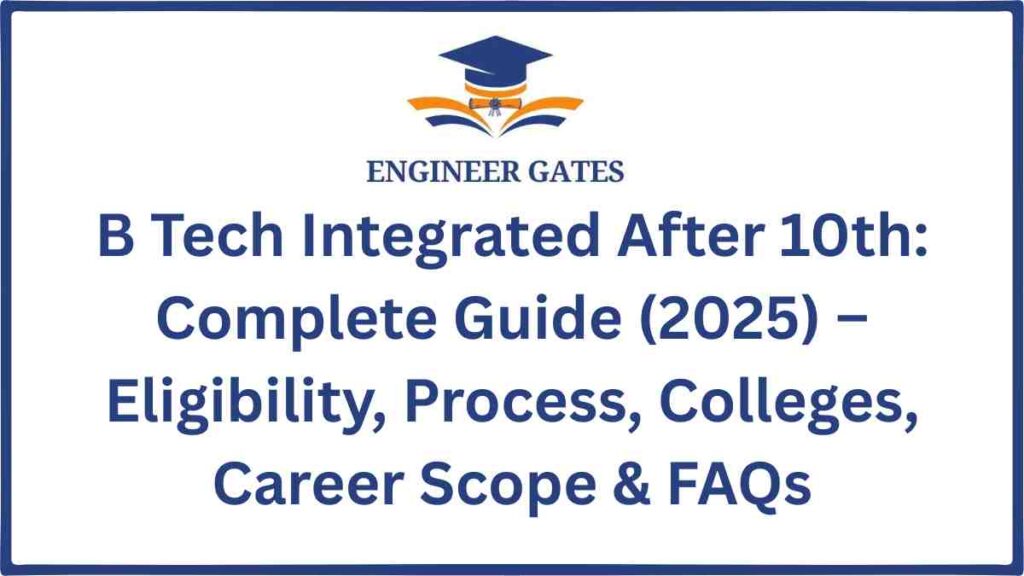In this guide you will find: eligibility, admission process, top colleges, branches, placements, and cutoffs.
Integrated BTech after 10th: What is it?
Integrated B Tech after 10th is a 6-year program that combines Science, Maths and core engineering principles in a single curriculum. In this, you do not need to do 12th or diploma separately – admission is given directly after 10th, and you get an engineering degree in the same flow.
Key Highlights & Benefits
- Early Start: Direct engineering journey after 10th.
- 6-Year Duration: Foundation + Advanced Engineering together.
- No Separate 12th/Diploma Needed: Save time and effort.
- Industry-Ready Skills: Practical labs, internships, projects.
- Career Edge: Early completion = Early job opportunities.
- Focused Curriculum: Entrance exam prep + deep engineering concepts.
- Specializations: Computer Science, Mechanical, AI, Civil, etc.
Eligibility Criteria & Admission Process
Eligibility:
- 10th pass (minimum 55% – college-specific requirement).
- Science/Maths background preferred.
- Some colleges also consider rural background or state quota.
Admission Process:
- College entrance test (CET) or merit-based selection.
- By filling the application form (online/offline).
- Counselling/interview can take place after shortlisting.
- Documents verification & fee payment.
Important: The process of each college may be different. Check the official website.
Top Colleges Offering Integrated B Tech After 10th
| College Name | Location | Branches/Specializations | Duration | Fees (Approx.) |
| MIT-WPU | Pune | Mechanical (Robotics), AI, CS, Civil | 6 Years | ₹1.5-2.5 lakh/year |
| Yadavindra College of Engineering (YCOE) | Bathinda (Pb.) | Computer Science (Rural quota) | 6 Years | ₹1.3 lakh/year |
| Sanjivani University | Maharashtra | Computer Science, Mech, Civil, etc. | 6 Years | ₹1.3 lakh/year |
Note: Fees, branches, seat intake vary college-wise. Check the latest information on the official site.
Branches & Specializations
- Computer Science & Engineering (CSE)
- Mechanical Engineering (Robotics, Automation)
- Electrical Engineering
- Civil Engineering
- Electronics & Communication
Pro Tip: Based on popularity and placement, Robotics is the top choice.
Course Structure & Curriculum
- 1st-2nd Year: Foundation (Maths, Physics, Chemistry, Basic Engineering)
- 3rd-4th Year: Core Engineering Subjects (Branch-specific)
- 5th-6th Year: Advanced Topics, Projects, Internships, Industry Training
Outcome: Degree is – Bachelor of Technology (B Tech), recognized by UGC/AICTE.
Fees & Scholarships
- Fees: ₹1 lakh – ₹2.5 lakh per year (college-specific).
- Scholarships: Merit-based, state quota, reserved categories, rural quota (YCOE).
Cutoff (Branch-wise & College-wise)
- MIT-WPU: Entrance test/CET score required, branch-wise cutoffs are subject to change every year..
- YCOE: 55% in 10th (rural quota), limited seats (60).
- Sanjivani University: Cutoff based on CAT score, branch preference.
Tip: It is important to check the previous year cutoffs on official college websites.
Career Scope, Placements & PSU Jobs
- Placements: Early entry = Early graduation = Early job offers.
- Top Sectors: IT, Robotics, Manufacturing, Core Engineering, Startups.
- PSU Jobs: After B.Tech degree one becomes eligible for PSU exams(like GATE).
- Minimum Rank for PSU: GATE score required; every PSU has different cutoffs (general trend: 60-70 percent+).
Normalization Process & Latest Trends
- Normalization: Entrance test scores are normalized at the college/state level (each college has its own process).
- Trends (2025):
- The craze for AI, Robotics, Data Science branches is increasing.
- Focus is being given on industry tie-ups, internships and project based learning.
- Special Quota for Rural/Underprivileged Students (YCOE).
Pros & Cons: Is It Right For You?
Pros:
- Time saving (no separate 12th/diploma)
- Early industry exposure
- Focused, practical curriculum
Cons:
- Initial specialization (may be a problem if interests change)
- Limited colleges offer this option
- Admissions can be competitive
Step-by-Step Admission Guide
- Research Colleges: Eligibility, branches, fees, Check the placement stats.
- Prepare for Entrance Test: Strengthen the basics of maths, science.
- Fill Application: Fill the form from the official site.
- Appear for CET/Interview: The syllabus will be available on the college website.
- Result & Counselling: When the merit list comes, select the branch.
- Document Verification & Fee Payment: Confirm Admission.
FAQs:
1. What is Integrated B Tech after 10th?
A 6-year engineering programme that starts directly after 10th.
2. What is the eligibility?
10th pass (55%+), Science/Maths background preferred.
3. Which are the top colleges?
MIT-WPU, YCOE, Sanjivani University, and some other private/public colleges.
4. What is the admission process?
Entrance test or merit-based selection, followed by counselling.
5. Which branches are available?
CSE, Mechanical, AI, Civil, etc.
6. What is the fees?
₹1 lakh – ₹2.5 lakh per year (college-specific).
7. What is the placement scope?
Good placements in IT, core engineering, and startups.
8. Are you eligible for PSU jobs?
Yes, you can appear for GATE/PSU exams after getting B Tech degree.
9. What is the normalization process?
Entrance test scores are normalized at college/state level.
10. Is B Tech degree valid without 12th?
Yes, if the college is UGC/AICTE approved then the degree is valid.
11. What is rural quota?
Some colleges (like YCOE) keep special seats for rural students.
12. Can one get scholarship?
Yes, merit-based or reserved category scholarships are available.
Conclusion & Next Steps
Integrated B Tech after 10th is a smart shortcut for ambitious students to start engineering career – without wasting time on 12th/Diploma. If you have genuine interest in engineering, this program can give you early industry exposure, strong foundation, and better career options.
Next Step: Visit the official websites of the target colleges to check eligibility, admission dates and syllabus.


